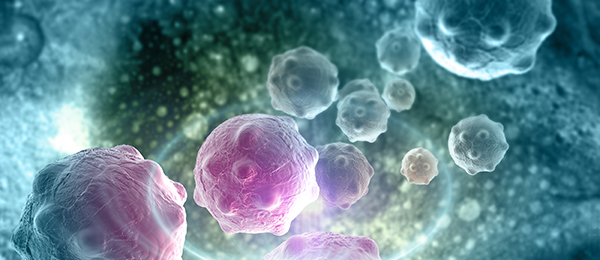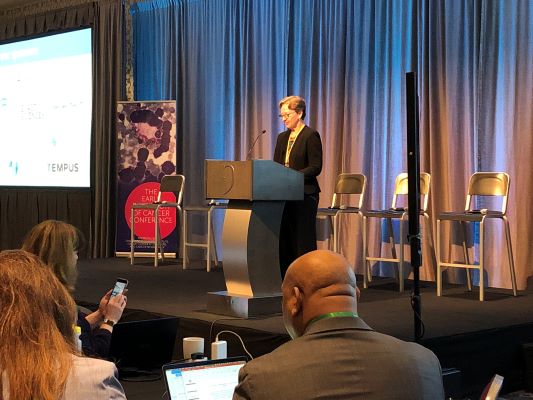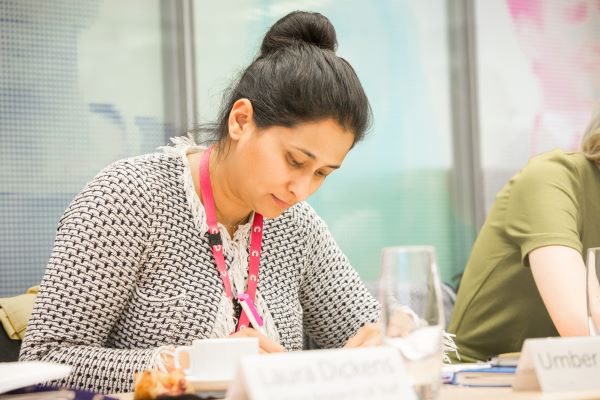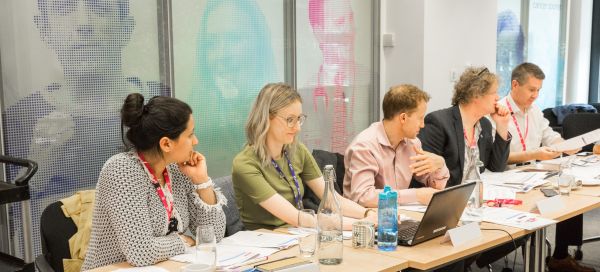EARLY DETECTION AND DIAGNOSIS NEWSLETTER Hi Voornaam,
Welcome to your final Early Detection and Diagnosis newsletter of 2022. It’s been another busy and productive year for our team, and as the year draws to a close, we’re reflecting on progress in the early detection community – needless to say, one of our highlights has been the return of in-person conferences.
In October, we held our seventh Early Detection Conference in Portland, in collaboration with the OHSU Knight Cancer Institute and the Canary Center at Stanford. Over this three-day event, researchers from many backgrounds united to discuss the latest topics in early detection research, ranging from microbiological risk factors to emerging technologies and precision diagnosis. At the conference dinner, we presented the Don Listwin Award to Dr Sudhir Srivastava for his outstanding contributions to the cancer early detection field.
Over here in London, Cancer Research UK partnered with Black in Cancer on their first international conference. It was humbling to listen and contribute to much-needed conversations about how to empower the next generation of Black cancer researchers, with a strong emphasis on strengthening the research pipeline and improving patient experience. The event was a success, and a second conference is already being discussed. Read on for some thought-provoking highlights.
Following the release of our prevention research strategy earlier this year, we have recently launched a new funding scheme, the Biology to Prevention Awards. We’re holding a dedicated webinar on 23 November – keep reading for more information.
On a personal note, I was recently interviewed in EMJ Oncology’s podcast – give it a listen to hear about what we’re doing in the cancer prevention and early detection sphere and what I believe to be the main challenges of the field.
We wish everyone an excellent end to 2022 and look forward to engaging with you through future events and opportunities in 2023.
Kind regards,
David Crosby
Head of Prevention and Early Detection Research
Cancer Research UK |
|
|---|
|
|---|
|
|
 OUR HIGHLIGHTS FROM #EDxCONF22 Special thanks to everyone who joined our Early Detection of Cancer Conference last month. Over the years, this event has grown from a small summit of experts to a dynamic meeting with hundreds of participants across the field. This year was no exception, with all 400 tickets being sold out and a record number of poster presentations.
During the conference, we explored themes ranging from advanced biological models to emerging cutting edge technologies for early detection and precision diagnosis. We also saw the return of our popular ‘Great Debate’ format, where our speakers went head-to-head on some of the field’s hottest topics, such as multi cancer screening and over-diagnosis.
We hope you had a rewarding time at the conference, and we look forward to seeing you again in 2023. |
|
|---|
|  THE EARLY DETECTION OF CANCER CONFERENCE 2023 – SAVE THE DATE We’re already working behind the scenes for our 2023 event, which will be held on 10–12 October in London, UK.
Our Scientific Programme Committee features Fiona Walter (Queen Mary, University of London), Ramasamy Paulmurugan (Canary Center at Stanford), and Julia Maxson (OHSU Knight Cancer Institute).
Save the date and register your interest to be the first to hear when registration opens. |
|
|---|
|
|---|
|
|
 NEW BIOLOGY TO PREVENTION AWARDS – JOIN OUR WEBINAR We have just launched a new funding scheme, the Biology to Prevention Award. This award aims to harness biological and mechanistic insights to provide new targets and approaches for cancer prevention, and has flexible funding from around £100k for pilot studies, up to £600k for longer-term projects. Applications close on 12 January 2023.
Any questions? Join our dedicated webinar on 23 November, 2PM. |
|
|---|
|  CALLING ALL BEHAVIOURAL SCIENTISTS – HEAR FROM OUR FUNDING COMMITTEE Are you a behavioural scientist considering submitting an application to our Prevention and Population Research or Early Detection and Diagnosis Research Committee? We’ve organised a webinar to give you insights and guidance on what makes a successful application. Join at 1PM on 29 November to hear about our funding opportunities, as well as tips from our committee members Professors Kate Brain and Mark Tully and Cancer Research UK-funded behavioural researcher Professor Katie Robb. |
|
|---|
|
|---|
|
|
 OPEN CALL FOR NEW COMMITTEE MEMBERS We are seeking new members on our Prevention and Population Research funding committee. If you’re working primarily in discovery biology and you have an emerging interest or track record of working to enable translation towards cancer prevention, we’d love to hear from you. Applications close on 12 December 2022. |
|
|---|
|  OPT INTO REGISTERED REPORTS Applying for our Early Detection and Diagnosis, Prevention and Population Project Award or Biology to Prevention Award? Remember, you can opt into our Registered Reports funding partnership when applying for these schemes.
Registered Reports are a novel method of publishing making research methodology and findings more accessible by de-linking results and publication. Join our pilot and help improve research quality and transparency. |
|
|---|
|
|---|
|
|
WHAT WE’VE LEARNED FROM THE BLACK IN CANCER CONFERENCE 2022 “Cancer is a very, very heterogeneous disease. The workforce has to be just as different, just as diverse, for us to make tremendous change.”
If you’ve missed our inaugural Black in Cancer Conference, catch up on the stimulating discussions we had, the unique stories and insights from the speakers and our key takeaways. |
|
|---|
|
|---|
|
|
INTRODUCING OUR NEW CHIEF SCIENTIST, PROFESSOR KJ PATEL We’re delighted to announce the appointment of our new chief scientist, Professor KJ Patel. KJ brings a wealth of experience to his new role at Cancer Research UK, helping direct funding and ensuring our investment has the best chance of delivering ground-breaking discoveries. KJ has worked closely with Cancer Research UK throughout his career, and his research has contributed to greater understanding of what drives cancer development, such as how alcohol exposure can cause cancer, opening new opportunities for prevention, detection and treatment. |
|
|---|
|
|---|
|
|
| Been forwarded this email? Subscribe to our newsletter to stay up to date. |
|---|
| |
|---|
|
|
|